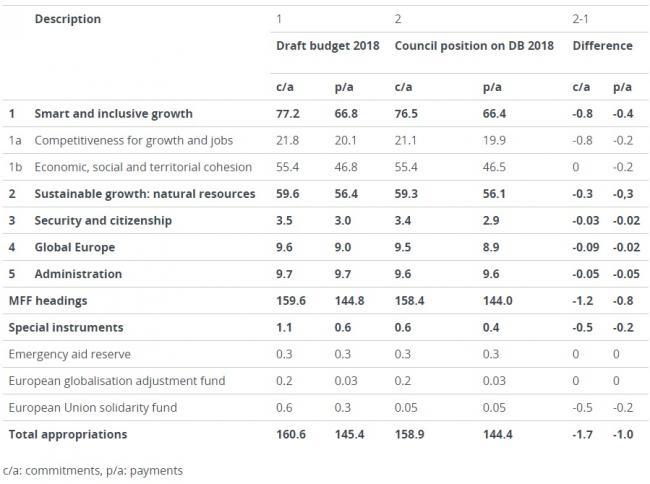Council agrees its position for the 2018 EU budget and backs increase of 2017 EU budget
On 12 July 2017, the EU ambassadors agreed the Council's position on the 2018 EU draft budget, ahead of the negotiations with the European Parliament starting in October.
The Council's position for 2018 amounts to €158.9 billion in commitments and €144.4 billion in payments, up by 0.6% and 7.4% respectively compared to the 2017 EU budget. Payments increase significantly because the implementation of the 2014-2020 programmes is expected to reach cruising speed following the initial start-up period. The Council's position strongly focuses on measures to stimulate jobs and growth, strengthen security and tackle migration. It also keeps sufficient margins under the EU's multi-annual financial framework 2014-2020 in case unexpected needs arise.
"I believe the Council's position provides a solid basis on which to achieve a 2018 EU budget that would take the EU forward. The Council proposes, in line with its generally frugal approach to the budget, to focus resources on those areas with the highest added value. The Council's position also helps the EU to act swiftly in case new challenges arise", said Märt Kivine, the Estonian Deputy Finance Minister and the Presidency's Special Representative for the EU budget. "Timely agreement on the 2018 budget is a test of the EU's credibility and a presidency priority", he added.
2017: solidarity with young unemployed persons and Italy
The Council's Permanent Representatives Committee on 12 July 2017 also approved two Commission proposals that reinforce the EU's support to young unemployed persons in their job search and help the Italian regions hit by earthquakes in 2016 in their task of reconstruction. Draft amending budget no 3 increases the 2017 EU budget by €500 million in commitments for the youth employment initiative. Draft amending budget no 4 mobilises €1.2 billion under the EU's solidarity fund following the earthquakes in Abruzzo, Lazio, Marche and Umbria.
2018: focus on jobs, growth, security and migration
Sustaining growth and job creation remains one of the Council's most important priorities. In 2018, the Council wants to support smart and inclusive growth with €76.5 billion in commitments and €66.4 billion in payments, up by 2.1% and 17.5% respectively compared to 2017.
Actions financed under this heading include notably
● the EU's research and innovation programme Horizon 2020 with €10.6 billion in commitments and €10.8 billion in payments, which is an increase by 2.6% and 5.8% respectively compared to the 2017 EU budget
● the connecting Europe facility to support trans-European networks in transport, energy and communication sectors, with €4.3 billion in commitments and €2.1 billion in payments (+3.9% and +31.7%) including contributions from the cohesion fund
● Erasmus+, with €2.3 billion in commitments (+9.5%) and €2.1 billion in payments (+13.1%)
● the new European solidarity corps, with €72.8 million in commitments and €55.7 million in payments
● European aid for the most deprived, with €556.9 million in commitments and €401.4 million in payments
● the youth employment initiative, with €233.3 million in commitments and €600.0 million in payments
To ensure a high level of security the Council backed the amounts proposed by the Commission. This means that €720.0 million in commitments and €481.2 million in payments could be spent under the internal security fund to enhance border protection, fight against cross-border crime, establish an entry/exit system and set up a European travel information and authorisation system.
The Council also approved the €719.2 million in commitments and €594.4 million in payments proposed by the Commission for the asylum, migration and integration fund to address the migration pressure. The money will help member states to address migration flows, integrate persons who have the right to stay and return those who don't. The Council's position also contains €200.0 million in commitments and €220.6 million in payments for the EU emergency support mechanism within the EU. It enables the EU to help member states confronted with a natural or man-made disaster, such as the sudden and massive inflow of refugees and migrants.
With regard to administrative expenditure the Council acknowledged the efforts made to reach the 5% staff reduction target. It underlined the importance of keeping under continuous monitoring the level of staff in all EU institutions in order to ensure that the savings achieved are lasting.
A summary of the draft Council's position is set out in the table below:
in € billion

Source: European Council Council of the European Union
- 316 reads
Human Rights
Fostering a More Humane World: The 28th Eurasian Economic Summi

Conscience, Hope, and Action: Keys to Global Peace and Sustainability

Ringing FOWPAL’s Peace Bell for the World:Nobel Peace Prize Laureates’ Visions and Actions

Protecting the World’s Cultural Diversity for a Sustainable Future

Puppet Show I International Friendship Day 2020

